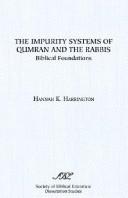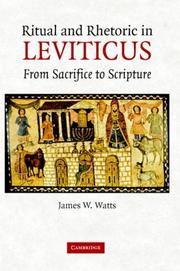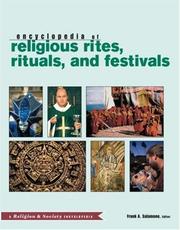| Listing 1 - 10 of 19 | << page >> |
Sort by
|
Book
ISBN: 9030409789 Year: 1999 Publisher: Baarn : Gooi en Sticht,
Abstract | Keywords | Export | Availability | Bookmark
 Loading...
Loading...Choose an application
- Reference Manager
- EndNote
- RefWorks (Direct export to RefWorks)
Liturgy --- ritueel --- 264 --- Ritualism --- #gsdb9 --- #GGSB: Liturgie --- #GGSB: Rituelen --- #GGSB: Symbolen --- 247 --- rituelen (ler) --- Ritual --- Liturgie --- 264 Liturgie --- Rituelen --- Symbolen

ISBN: 1555408443 1555408451 Year: 1993 Publisher: Atlanta Scholars Press
Abstract | Keywords | Export | Availability | Bookmark
 Loading...
Loading...Choose an application
- Reference Manager
- EndNote
- RefWorks (Direct export to RefWorks)
Purity, Ritual --- Rabbinical literature --- Biblical teaching --- Judaism --- History and criticism --- Bible. --- Dead Sea scrolls. --- Criticism, interpretation, etc.

ISBN: 9780521871938 9780511499159 9781107407954 0511499159 9780511296673 0511296673 0511295928 9780511295928 052187193X 9786610959815 6610959811 1107407958 9781139132695 1139132695 1107180503 1280959819 0511294352 0511295138 9780511294358 Year: 2007 Publisher: Cambridge New York Cambridge University Press
Abstract | Keywords | Export | Availability | Bookmark
 Loading...
Loading...Choose an application
- Reference Manager
- EndNote
- RefWorks (Direct export to RefWorks)
Ritual and Rhetoric in Leviticus uses rhetorical analysis to expose the motives behind the writing of the central book of the Torah/Pentateuch and its persuasive function in ancient Judaism. The answer to the question, 'who was trying to persuade whom of what by writing these texts?' proves to be quite consistent throughout Leviticus 1-16: Aaronide high priests and their supporters used this book to legitimize their monopoly over the ritual offerings of Jews and Samaritans. With this priestly rhetoric at its center, the Torah supported the rise to power of two priestly dynasties in Second Temple Judaism. Their ascendancy in turn elevated the prestige and rhetorical power to the book, making it the first real scripture in Near Eastern and Western religious traditions.
Cohanim. --- Ritual. --- Purity, Ritual --- Judaism. --- Bible. --- Criticism, interpretation, etc. --- Language, style. --- Cohanim --- Ritual --- 222.3 --- Cult --- Cultus --- Liturgies --- Public worship --- Symbolism --- Worship --- Rites and ceremonies --- Ritualism --- Immersion (Judaism) --- Purity, Ritual (Judaism) --- Cohen (Cohanim) --- Kohanim --- Kohen (Cohanim) --- Judaism --- Priests, Jewish --- Exodus. Leviticus. Numeri --- Kitāb-i Va-yīgrā (Book of the Old Testament) --- Lāviyān (Book of the Old Testament) --- Leviticus (Book of the Old Testament) --- Lewigi (Book of the Old Testament) --- Newigi (Book of the Old Testament) --- Ṿa-yiḳra --- Ṿayiḳra (Book of the Old Testament) --- Vayikro --- Arts and Humanities --- Religion --- Purity, Ritual - Judaism.
Book
ISBN: 9028937811 9077070826 Year: 2005 Volume: *5 Publisher: Kapellen Pelckmans
Abstract | Keywords | Export | Availability | Bookmark
 Loading...
Loading...Choose an application
- Reference Manager
- EndNote
- RefWorks (Direct export to RefWorks)
Ritual. --- culturele antropologie --- ritueel --- masker --- Liturgy --- Sociology of religion --- Folklore --- Sociologie --- Cultuur --- Rituelen --- Cultuursociologie --- Ritual --- C3 --- cultuur --- rituelen --- verslaggeving --- 954.9 --- Maskers --- 291.3 --- 291.3 Godsdienstwetenschap: cultus; liturgie --- Godsdienstwetenschap: cultus; liturgie --- Cult --- Cultus --- Liturgies --- Public worship --- Symbolism --- Worship --- Rites and ceremonies --- Ritualism --- Kunst en cultuur --- Conferences - Meetings --- Ritueel --- Toerisme --- Erfelijkheidsleer --- Stadssamenleving --- Verpleegkunde
Book
ISBN: 9783110372731 3110372738 9783110368727 3110368722 9783110609431 3110609436 9783110368710 3110368714 9783110392678 3110392674 Year: 2016 Volume: 468 Publisher: Berlin Boston
Abstract | Keywords | Export | Availability | Bookmark
 Loading...
Loading...Choose an application
- Reference Manager
- EndNote
- RefWorks (Direct export to RefWorks)
What are rituals, if not ancient practices, unchanged throughout generations? Yet, if we compare the rituals described in late Second Temple texts to those in the Hebrew Bible it is apparent that rituals do change. Were such rituals practiced, or were they forms of textual imagination? How do rituals change and how are such changes authorized? Do textual innovation and ritual innovation relate?
Judaism --- Ritual. --- 221.08*4 --- Cult --- Cultus --- Jews --- 221.08*4 Theologie van het Oude Testament: cultus --- Theologie van het Oude Testament: cultus --- Customs and practices --- History. --- Religion --- Liturgies --- Public worship --- Symbolism --- Worship --- Rites and ceremonies --- Ritualism --- Religions --- Semites --- Ritual --- Customs and practices&delete& --- History --- festival calendar. --- impurity. --- inner-biblical interpretation.
Book
ISBN: 9030410523 Year: 2003 Volume: 5 Publisher: Kampen Gooi en Sticht
Abstract | Keywords | Export | Availability | Bookmark
 Loading...
Loading...Choose an application
- Reference Manager
- EndNote
- RefWorks (Direct export to RefWorks)
Liturgy --- Sacraments --- Occasional services --- Rites and ceremonies --- Sacraments (Liturgy) --- Liturgies --- Rites et cérémonies --- Sacrements --- Congresses. --- Congrès --- Liturgie --- 265 --- #gsdb4 --- Academic collection --- Liturgics --- Ceremonies --- Cult --- Cultus --- Ecclesiastical rites and ceremonies --- Religious ceremonies --- Religious rites --- Rites of passage --- Traditions --- Ritualism --- Manners and customs --- Mysteries, Religious --- Ritual --- Services, Occasional --- Worship programs --- Sacramenten:--algemeen --- Rites et cérémonies --- Congrès

ISBN: 0415941806 Year: 2004 Volume: *3 Publisher: New York Routledge
Abstract | Keywords | Export | Availability | Bookmark
 Loading...
Loading...Choose an application
- Reference Manager
- EndNote
- RefWorks (Direct export to RefWorks)
Sociology of religion --- Religious studies --- Religions --- Rites and ceremonies --- Rites et cérémonies --- Encyclopedias --- Encyclopédies --- Rites et cérémonies --- Encyclopédies --- Ceremonies --- Cult --- Cultus --- Ecclesiastical rites and ceremonies --- Religious ceremonies --- Religious rites --- Rites of passage --- Traditions --- Ritualism --- Manners and customs --- Mysteries, Religious --- Ritual --- encyclopedia --- church-state relations --- religious groups --- religious tolerance --- religious conflicts --- religious history --- religion and culture --- religious rites --- religious rituals --- religious festivals

ISBN: 0520081323 0520211596 0520920163 0585181713 9780520920163 9780585181714 9780520081321 9780520211599 Year: 1994 Publisher: Berkeley, California : University of California Press,
Abstract | Keywords | Export | Availability | Bookmark
 Loading...
Loading...Choose an application
- Reference Manager
- EndNote
- RefWorks (Direct export to RefWorks)
The search for transcendence is by no means limited to the Faustian West or the major world religions. Indeed, tribal peoples around the globe practice diverse but related forms of the spiritual quest. In this wide-ranging interdisciplinary study, Torrance argues that the quest is rooted in our biological, psychological, linguistic, and social nature. The human being is as much animal quaerens - the questing animal - in scientific inquiry as in shamanistic flight. The quest, for Torrance, is the effort to transcend our given limits in pursuit of a goal that cannot be wholly known in advance. It is a search for visionary truths, which are then transmitted in narratives that provide metaphors for individual and social transformation. Drawing on thinkers as diverse as Bergson and Piaget, van Gennep and Turner, Peirce and Popper, Freud and Darwin, Torrance concludes that the spiritual quest is not a rare mystical experience but an expression of human impulses. In first exploring the foundations of the spiritual quest, Torrance demonstrates that human culture is not a static affirmation of an immutable past but a perpetually transitional process. He then examines variations of this activity in the myths and religious practices of tribal peoples throughout the world, from Oceania to India, Africa, Siberia, and the Americas. Torrance finds that, even in the seemingly fixed rituals of agricultural and ancestral rites, change and futurity find a place. The role of the unknown greatly expands in spirit possession through communication with the beyond. Yet nowhere, Torrance shows, is the creative tension between communal ceremony and individual aspiration more striking than in the native cultures of North and South America, and nowhere does the drive for transcendence attain fuller expression than in the vision quests of the Northeastern Woodlands and of the Great Plains. In concluding his richly varied study of the quest, Torrance theorizes that this fundamental human activity must be understood as a ternary relation, outside the binary oppositions of structuralist thought. Through this inherently transitional activity, humanity transcends the continual impasse of the given in search of what lies forever beyond. Shaman and scientist, medium and poet, prophet and philosopher, all venture forth in quest of visionary truths to transform and renew the world to which they must always return.
Indian mythology --- Indians --- Spiritual life --- Vision quests --- Vie spirituelle --- Mythologie indienne d'Amérique --- Indiens --- Indiens d'Amérique --- Religion --- Cross-cultural studies --- Rites and ceremonies --- Etudes transculturelles --- Rites et cérémonies --- Indian mythology. --- Social & Cultural Anthropology --- Anthropology --- Social Sciences --- Mythology, Indian --- Mythology --- Quests, Vision --- Indians of North America --- Life, Spiritual --- Religious life --- Spirituality --- Cross-cultural studies. --- Religion. --- Religion and mythology --- affirmation. --- animal quaerens. --- communal ritual. --- communication with the beyond. --- comparative religion. --- ecstasy. --- ethnic religious practices. --- faust. --- folklore. --- human being. --- human experience. --- human impulses. --- humanity. --- individual transformation. --- interdisciplinary. --- major world religions. --- mobility. --- mythology. --- questing animal. --- ritual and myth. --- shaman. --- shamanism. --- social transformation. --- spirit possession. --- spiritual quest. --- spirituality. --- transcendence. --- transformation. --- tribal peoples. --- tribal religious practices. --- visionary truth.
Book
ISBN: 9780674046849 0674046846 9780674066038 0674058895 0674066030 0674262336 Year: 2010 Publisher: Cambridge: Harvard university press,
Abstract | Keywords | Export | Availability | Bookmark
 Loading...
Loading...Choose an application
- Reference Manager
- EndNote
- RefWorks (Direct export to RefWorks)
Who were the Gnostics? And how did the Gnostic movement influence the development of Christianity in antiquity? Is it true that the Church rejected Gnosticism? This book offers an illuminating discussion of recent scholarly debates over the concept of 'Gnosticism' and the nature of early Christian diversity. Acknowledging that the category 'Gnosticism' is flawed and must be reformed, David Brakke argues for a more careful approach to gathering evidence for the ancient Christian movement known as the Gnostic school of thought. He shows how Gnostic myth and ritual addressed basic human concerns about alienation and meaning, offered a message of salvation in Jesus, and provided a way for people to regain knowledge of God, the ultimate source of their being. Rather than depicting the Gnostics as heretics or as the losers in the fight to define Christianity, Brakke argues that the Gnostics participated in an ongoing reinvention of Christianity, in which other Christians not only rejected their ideas but also adapted and transformed them. This book will challenge scholars to think in news ways, but it also provides an accessible introduction to the Gnostics and their fellow early Christians.
Gnosticism. --- Church history --- Gnosticisme --- Eglise --- Histoire --- -273.1*11 --- Christianity --- Ecclesiastical history --- History, Church --- History, Ecclesiastical --- History --- Gnosis en christendom --- 273.1*11 Gnosis en christendom --- Gnosticism --- 273.1*11 --- Apostolic Church --- Church, Apostolic --- Early Christianity --- Early church --- Primitive and early church --- Primitive Christianity --- Fathers of the church --- Great Apostasy (Mormon doctrine) --- Gnosticisme. --- Église --- Doctrines --- Église --- Cults --- Church history - Primitive and early church, ca. 30-600. --- Gnosis --- mythology --- ritual --- early Christianity
Book
ISBN: 0041490444 0041490452 Year: 1977 Publisher: London Unwin paperbacks
Abstract | Keywords | Export | Availability | Bookmark
 Loading...
Loading...Choose an application
- Reference Manager
- EndNote
- RefWorks (Direct export to RefWorks)
Avalokiteśvara (Buddhist deity) --- Cult. --- S13A/0360 --- #SML: Joseph Spae --- China: Religion--Chinese Buddhism: ritual and practice (incl. prayers, festivals, ..) --- Avalokiteśvara (Buddhist deity) --- Cult --- Kuan Yin, the celestial Bodhisattva of Compassion --- the Chinese Goddess of Love --- mysticism of Buddhist China and Tantra in Tibet --- cult, rites and rituals --- folk goddess --- the Far East --- divine compassion --- attaining enlightenment --- perceiving the ultimate nature of reality --- Chinese and Tibetan sacred art --- devotional poems and yogic texts --- contemplative meditation techniques
| Listing 1 - 10 of 19 | << page >> |
Sort by
|

 Search
Search Feedback
Feedback About UniCat
About UniCat  Help
Help News
News